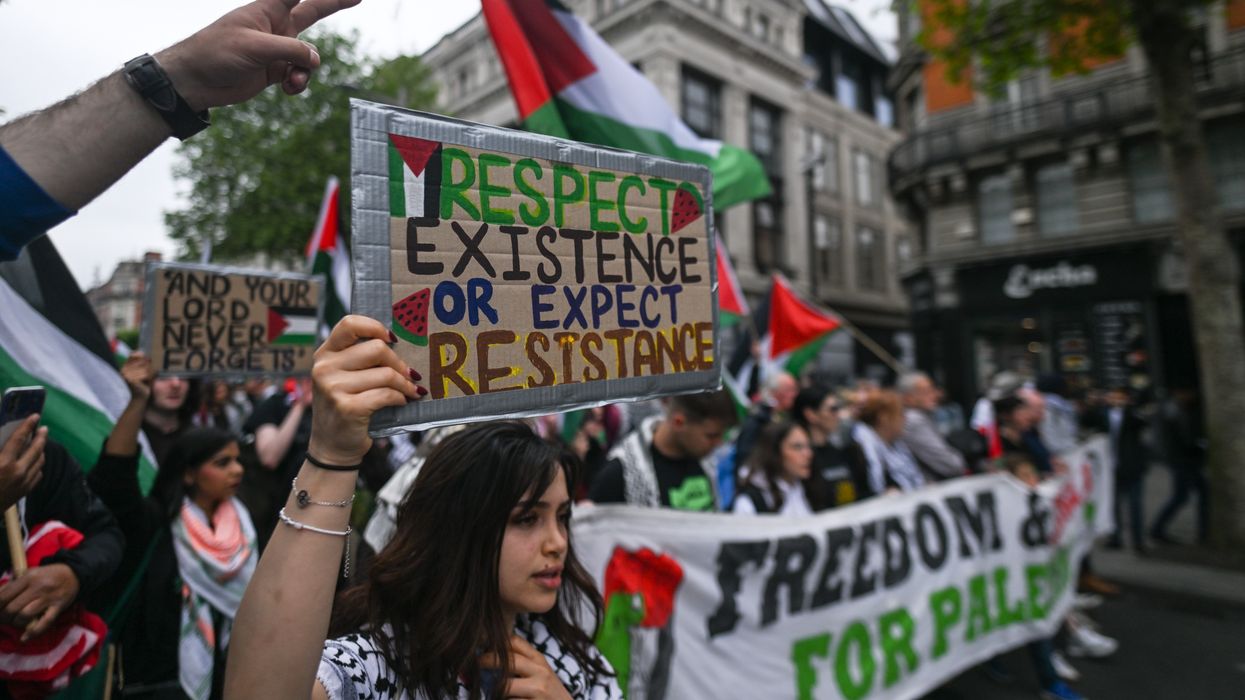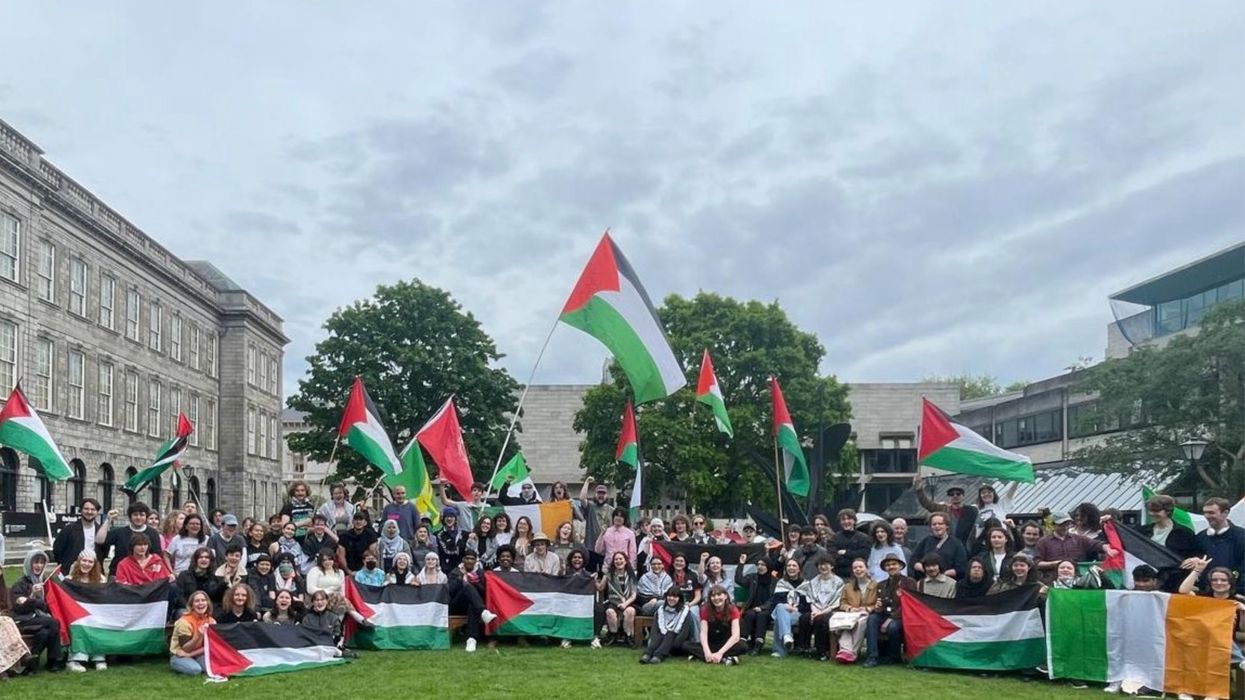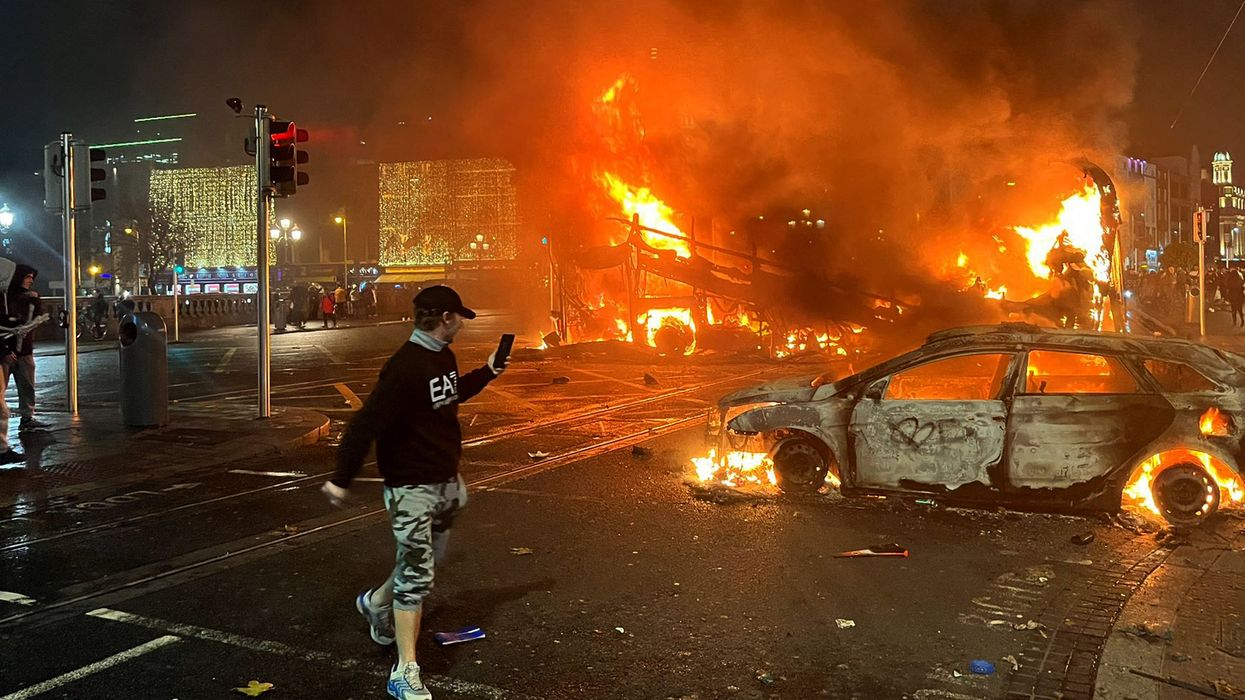"We are glad that this agreement has been reached and are committed to further constructive engagement on the issues raised," senior dean Eoin O'Sullivan said. "We thank the students for their engagement."
Outgoing Trinity College Dublin Students' Union (TCDSU) president László Molnárfi called the agreement a "testament to grassroots student-staff power."
Incoming TCDSU president Jenny Maguire contrasted the situation at her school to the violent repression of student-led protests on some U.S. campuses.
"The college was determined that it would be an example going forward," Maguire said, according to The New York Times. "It refused to follow the U.S. example of bringing police in and made it clear that it would not pursue anything like that here."
TCD's statement affirmed:
We fully understand the driving force behind the encampment on our campus and we are in solidarity with the students in our horror at what is happening in Gaza. We abhor and condemn all violence and war, including the atrocities of October 7th, the taking of hostages, and the continuing ferocious and disproportionate onslaught in Gaza. The humanitarian crisis in Gaza and the dehumanization of its people are obscene. We support the International Court of Justice's position that "Israel must take all measures within its power to prevent and punish the direct and public incitement to commit genocide in relation to members of the Palestinian group in the Gaza Strip."
"Trinity will endeavor to divest from investments in other Israeli companies," the school added, vowing to establish a task force on the issue.
"A real and lasting solution that respects the human rights of everyone needs to be found," the TCD statement said.
The protest camp—which was spearheaded by TCDSU and the Palestinian-led Boycott, Divestment, and Sanctions movement—was erected Friday night on Fellow's Square, at the heart of Ireland's oldest university. Students demanded that TCD sell off its investments in three Israeli companies included on a United Nations "blacklist" first published in 2020 for their links to human rights violations committed by Israel in the West Bank and East Jerusalem.
The TCD protest came amid Israel's 216-day assault on Gaza, which has left at least 124,000 Palestinians dead, maimed, or missing in what the International Court of Justice in January called a "plausibly" genocidal campaign. Support for Palestine runs strong and deep in Ireland, which, like Palestine, was also colonized by the British, and where many people see parallels between their historic repression and Israel's crimes against Palestinians.
TCD's campus—which is located in the center of the Irish capital—had been shut down for five days, a move that affected the school's income as it houses the Book of Kells, an ancient Celtic manuscript visitors pay from €16-€33.50 ($17-$36) to see. According to The Irish Times, the Book of Kells generates approximately €350,000 ($377,000) in weekly income during the busy summer months.
Last week, the TCD fined TCDSU €214,000 ($231,000) for financial losses stemming from multiple protests held throughout this academic year.
Meanwhile in the United States—where a pair of Republican senators this week introduced legislation to brand students protesting for Palestine as "terrorists" and add them to the no-fly list—campus encampments continued to spread from coast to coast.
On Wednesday, progressive U.S. Congresswomen Rashida Tlaib (D-Mich.) and Cori Bush (D-Mo.) spoke alongside student protesters from George Washington University outside the U.S. Capitol.
"We will not stop in defending these students until [the] end in regards to the genocide... until there is an immediate and permanent cease-fire that includes complete withdrawal of Israeli forces from Gaza," said Tlaib, the only Palestinian American member of Congress. "We're proud to use our positions in office to bring these voices, so you all don't forget why there are encampments, why there are movements and dissent around this country."
While crackdowns and violence by police and Israel supporters have garnered most of the headlines in the U.S., at least eight schools across the country including California State University, Sacramento; Evergreen State College; University of California, Riverside; Brown University; Rutgers University; State University of New York, Purchase; Northwestern University; and University of Minnesota have agreed to some or all of students' demands.
After a week of demonstrations at a student-led encampment at California State University, Sacramento, administrators said they would revise the school's socially responsible investment policy and refrain from investments linked to Israeli human rights violations in Palestine.
"I think it's so significant what we did here because we're essentially raising the bar for all universities," Sacramento State sophomore Michael Lee-Chang told The Intercept. "We've had every single one of our demands met, and that's how it should be. We're here for Palestine, and student power shouldn't be underestimated. I can't state just how excited I am and can't wait to see how our win helps other campuses reach their victories too."
Faculty at U.S. colleges and universities have also been taking a more active role in the protests. Professors and other staff at the New School in New York City set up a solidarity camp on Wednesday, erecting tents with signs including "Faculty Against Genocide" and "Jews for Palestine."
As of Thursday, more than 800 Jewish professors had signed an open letter demanding that lawmakers and U.S. President Joe Biden oppose the so-called Antisemitism Awareness Act, House-approved legislation the educators warn will "amplify the real threats Jewish Americans already face" by "conflating antisemitism with legitimate criticism of Israel."




